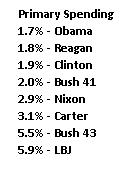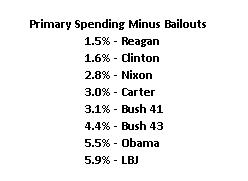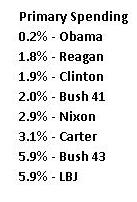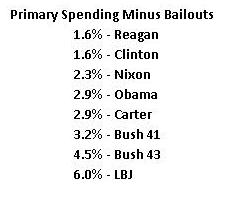
Posted on 08/30/2013 6:01:15 AM PDT by Kaslin
I got involved in a bit of a controversy last year about presidential profligacy.
Some guy named Rex Nutting put together some data on government spending and claimed that Barack Obama was the most frugal President in recent history.
I pointed out that Mr. Nutting’s data left something to be desired because he didn’t adjust the numbers for inflation.
Moreover, most analysts also would remove interest spending from the calculations since Presidents presumably shouldn’t be held responsible for servicing the debt incurred by their predecessors.
 But even when you make these adjustments and measure inflation-adjusted “primary spending,” it turns out that Nutting’s main assertion was correct. Obama is the most frugal President in modern times.
But even when you make these adjustments and measure inflation-adjusted “primary spending,” it turns out that Nutting’s main assertion was correct. Obama is the most frugal President in modern times.
When you look at the adjusted numbers, though, Reagan does a lot better, ranking a close second to Obama.
I also included Carter, Nixon, and LBJ in my calculations, though it’s worth noting that none of them got a good score. Indeed, President Johnson even scored below President George W. Bush.
Some of you may be thinking that I made a mistake. What about the pork-filled stimulus? And all the new spending in Obamacare?
Most of the Obamacare spending doesn’t begin until 2014, so that wasn’t a big factor. And I did include the faux stimulus. Indeed, I even adjusted the FY2009 and FY2010 numbers so that all of stimulus spending that took place in Bush’s last fiscal year was credited to Obama.
So does this mean Obama is a closet conservative, as my misguided buddy Bruce Bartlett has asserted?
Not exactly. Five days after my first post, I did some more calculations and explained that Obama was the undeserved beneficiary of the quirky way that bailouts and related items are measured in the budget.
It turns out that Obama supposed frugality is largely the result of how TARP is measured in the federal budget. To put it simply, TARP pushed spending up in Bush’s final fiscal year (FY2009, which began October 1, 2008) and then repayments from the banks (which count as “negative spending”) artificially reduced spending in subsequent years.
And when I removed TARP and other bailouts from the equation, Obama plummeted in the rankings. Instead of first place, he was second-to-last, beating only LBJ.
Instead of first place, he was second-to-last, beating only LBJ.
But this isn’t the end of the story. My analysis last year only looked at the first three years of Obama’s tenure.
We now have the numbers for his fourth year. And if you crank through the numbers (all methodology available upon request), you find that Obama’s numbers improve substantially.
 As the table illustrates, inflation-adjusted non-interest spending has grown by only 0.2 percent per year. Those are remarkably good numbers, due in large part to the fact that government spending actually fell in nominal terms last year and is expected to shrink again this year.
As the table illustrates, inflation-adjusted non-interest spending has grown by only 0.2 percent per year. Those are remarkably good numbers, due in large part to the fact that government spending actually fell in nominal terms last year and is expected to shrink again this year.
We haven’t seen two consecutive years of lower spending since the end of the Korean War!
Republicans can argue, of course, that the Tea Party deserves credit for recent fiscal progress, much as they can claim that Clinton’s relatively good numberswere the result of the GOP sweep in the 1994 elections.
I’ll leave that debate to partisans because I now want to do what I did last year and adjust the numbers for TARP and other bailouts.
In other words, how does Obama rank if you adjust for the transitory distorting impact of what happened during the financial crisis?
Well, as you can see from this final table, Obama’s 2013 numbers are much better than his 2012 numbers.  Instead of being in second-to-last place, he’s now in the middle of the pack.
Instead of being in second-to-last place, he’s now in the middle of the pack.
I used a slightly different methodology this year to measure the impact of TARP and related items, so all of the numbers have changed a bit, but Reagan is still the champ and everyone else is the same order other than Obama.
So what does all this mean?
As I constantly remind people, good fiscal policy occurs when the burden of government spending is falling as a share of economic output.
And this happens when policy makers follow my Golden Rule and restrain spending so that it grows slower than the private economy.
That’s actually been happening for the past couple of years. Even after you adjust for the quirks of how TARP repayments get measured.
I’m normally a pessimist, but if advocates of small government can maintain the pressure and get some concessions during the upcoming fights over spending levels for the new fiscal year and/or the debt limit, we may even see progress next year and the year after that.
And if we eventually get a new crop of policymakers who are willing to enactgenuine entitlement reform, the United States may avoid the future Greek-style fiscal crisis that is predicted by the BIS, OECD, and IMF.
That would almost be as good as a national championship for the Georgia Bulldogs!
Not to undercomplicate things, but he’s the worst president by any standard, and any fool can see that.
When America was young, a president could be bad for reasons having nothing to do with the nation’s economy.
He could be bad for having terrorist friends, and an America-hating father, and mother, and pastor, and team.
For appointing people like Clinton, Kerry, and Holder to high office.
For endorsing infanticide.
For gunrunning schemes and their deadly consequences.
One could make the case without any mathematics at all!
What is being spent today matters far less than unfunded liabilities/the debt. How did Obama do in that arena?
then why are we broke
But, sure, he's frugal when you calculate it for inflation ...
I caught that too. There are 3 major things I can see missing from the calculations.
1) Future liabilities
2) Real deficit spending
3) Old Inflation vs new inflation calculation as stated by government. According to our government, there has been almost no inflation over the past 10 years. Really?
He forgot to amortize all the future spending the likes of Social Security, Medicare, Medicaid, HUD, etc. caused. Never mind second-order effects.
For example, Section 8 housing enacted in 1937 spent “x” dollars that year and every year forward. Amendments in 1970 expanded the program to add “y” spending, so now it’s “x + y” every year. Now let’s add in demographic growth and program bloat. Now discount that back (from ad infinitum, or so it seems).
Second-order effects are a lot more complicated (inefficient resource allocation on the private and public side, cultural and social costs,etc. On the plus side, you have perhaps lower mortality (but then you have to add back higher health care costs)).
So, in other words, I’m not buying this article’s line of soap.
Nope, no new inflation, unless you include the commodity inflation index (food, oil, gold, etc)... which the Obamao administration leaves out of its calculations.
That arrogant pos occupant of 1600 Pennsylvania can hardly get one country to go along with us to go against a country that has never attacked us
How much of this reduction in spending is due to cuts in defense, which is the main duty of our central government? The Obama sequester is aimed at defeating our military.
Good grief... I went through all those numbers too, last year during the campaign.
It’s really very simple: Bush43 JACKED UP spending in his last year, in response to the financial crisis. Obama also JACKED UP spending in his first year. Look at the actual dollars spent in the budget. HUGE increases in 2008 and 2009.
Now, we’re expected to applaud Obama because he didn’t CONTINUE with huge % increases??
Gee, thanks Obama... for just maintaining the ridiculously HIGH level of government spending.
The REAL correlation is spending is... when Democrats or Republicans control the House.
Wrong, it wasn’t President Bush who jacked up the numbers. You forget that the rats had both the House and the Senate, and since Congress controls the spending the blame goes to the party who controls the Congress (both House and Senate)
Something is seriously wrong with these economic calculations when Obama's deficits and national debt are not considered.
Neither have been as high as today since the end of the Second World War.
Something is also seriously wrong when high unemployment, low wages and low economic growth rates are not considered.
None have been as bad for as long since the Great epression.
Something is also seriously wrong when exploding Federal welfare spending -- food stamps being most notorious -- is not considered.
In the history of the Republic, such spending has never been so high.
Finally and most seriously wrong of all is the failure to account for the fact that much of any real spending cuts have come from one of the few Constitutional functions of Washington: national defense.
Now go back and recalculate, and if Obama doesn't turn out the worst economic president ever, then I'll.... eat my tri-cornered 1776 patriot's hat! ;-) 
Bush 43 did not use his veto power very often (only 12x), but when he did it was often overridden.
http://www.senate.gov/reference/Legislation/Vetoes/BushGW.htm
Nice painting, thanks. :)
This just proves that you can make numbers work no matter what to support the agenda.
Disclaimer: Opinions posted on Free Republic are those of the individual posters and do not necessarily represent the opinion of Free Republic or its management. All materials posted herein are protected by copyright law and the exemption for fair use of copyrighted works.